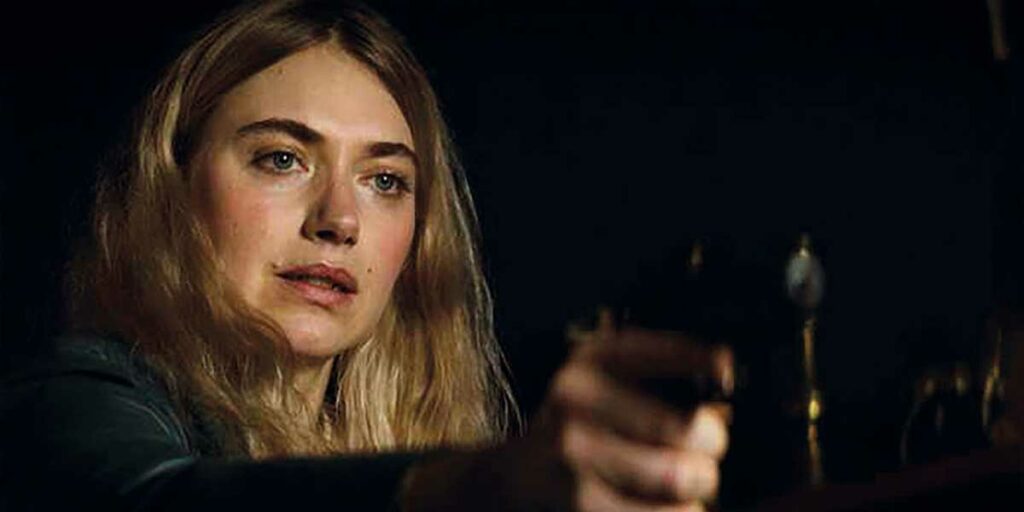Try as the cast might, Joe Lawlor and Christine Molloy‘s film Baltimore fails to get under the skin of a determined firebrand.
In their 2022 film essay The Future Tense, husband and wife filmmaking duo Joe Lawlor and Christine Molloy took stock; of themselves, their careers, their country. Though London-based, the pair retain a distinctly Irish point of view in their films, either setting them in Ireland, or at least featuring characters from the diaspora. One of the throughlines of The Future Tense was their efforts to get a passion project greenlit, namely the story of an unlikely terrorist named Rose Dugdale. Just a year later, the duo return with that project finally realised in the form of Baltimore. The Future Tense felt messy and unfocused, but Baltimore at least has a narrative to offer structure. Besides that, however, this new film isn’t much of an improvement.
Dugdale (Imogen Poots) was an English heiress who renounced her family’s privilege to become a leftist activist, most notably as a volunteer with the IRA in the early 1970s. Baltimore centres on Dugdale’s most notable achievement in her time with the IRA. In April 1974, Dugdale and three other IRA members committed one of the biggest art heists in history, stealing works by Reubens, Goya and Vermeer from a private collection in Russborough House, Co. Wicklow. The film opens with Dugdale taking in the lavish surroundings of Russborough post-heist, before storming out. Her loose wig and smeared eyeshadow gives her a look of the Joker, but where the Clown Prince of Crime dealt in anarchy, Baltimore plays things remarkably safe. Despite the fascinating crime, and the context in which it was committed, Dugdale’s life gets a reductive onscreen treatment.
Baltimore tells the story of Dugdale’s life via the ever-convenient use of flashbacks, offering the highlights of her pre-terrorism life like bullet points off her Wikipedia page. From the day of the robbery, we cut back to nominally formative moments of Dugdale’s life, haphazardly and with little narrative reason so to do. From rallying against the boys’ clubs of Oxford, to protests against British military activity in Northern Ireland, we see Dugdale’s activism in action, but a concrete reason for her move away from privilege is hard come by, other than she was ‘angry’. Baltimore feels painfully one-note, trying to capture the essence of a fierce woman, but never fully explaining it or offering much depth.
Lawlor and Molloy’s script offers little beyond predictable narrative beats and rebellious clichés. All of this leaves Poots flailing for much of the film; she is rarely able to get under Dugdale’s skin with such surface-level material. Any time Dugdale affects a fake French accent during the robbery to conceal her identity sounds fresh out of ‘Allo ‘Allo (“Now leesten very carefullee. I shall say zis only wance…”)
If the first half of Baltimore plays things safe, the second half is more confident, as the flashbacks become less frequent, and Dugdale and her compatriots retreat to deal with the fallout of the heist. With police on their trail, their country hideout becomes a paranoid den, with neighbours and the thieves’ own worries liable to give the game away. Tom Vaughan-Lawlor and Lewis Brophy do fine as her co-conspirators, and Poots does get more of a handle on Dugdale as her own doubts threaten the whole operation. Scenes between her and a kindly neighbour-turned-liability (Dermot Crowley) offer tension that is largely missing from the rest of Baltimore, no matter what the intrusive score tries to make us think. Baltimore also reinforces the fact that drone footage is a very predictable way to establish setting, even if Co. Cork is as picturesque a setting as one could ask for.
There is little to Baltimore that’s subtle, but this would be forgivable if it ever offered anything to say about Dugdale or her activism. As writers, directors and editors of the film, Lawlor and Molloy obviously admire her conviction, but with its simplistic storytelling, hectic structure, and an occasional lo-fi feel that feels mandated by budgetary concerns, Baltimore probably isn’t the worthy tribute they had in mind.
Baltimore was screened at the 2023 BFI London Film Festival on 6-9 October and will be released in UK and Irish cinemas on March 22, 2024. Read our interview with directors Joe Lawlor and Christine Molloy on Baltimore!

